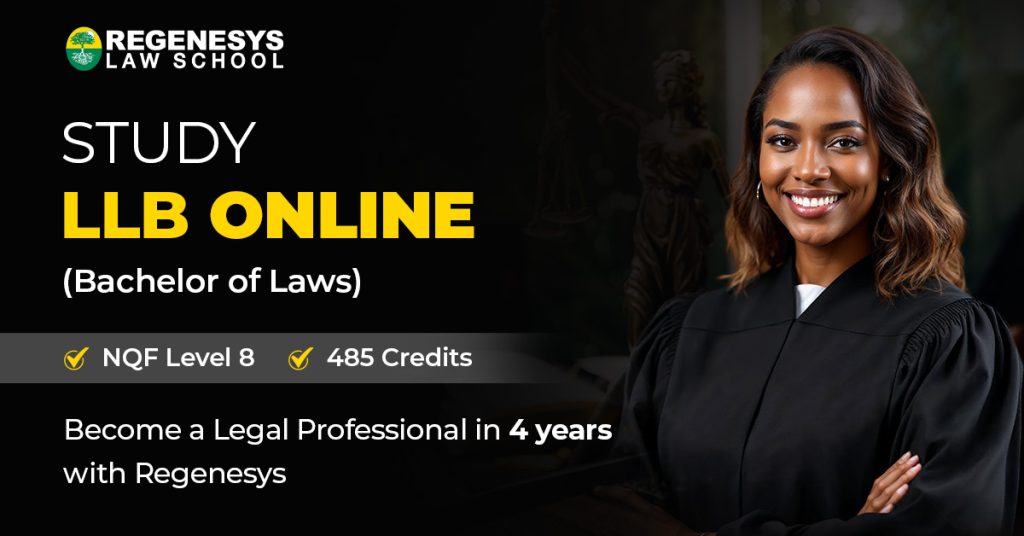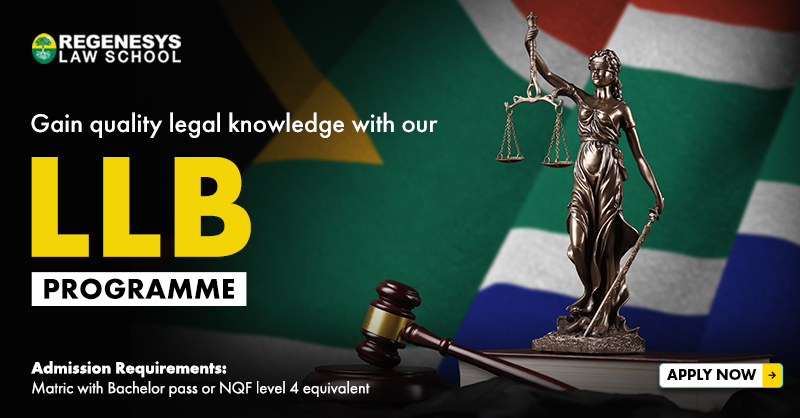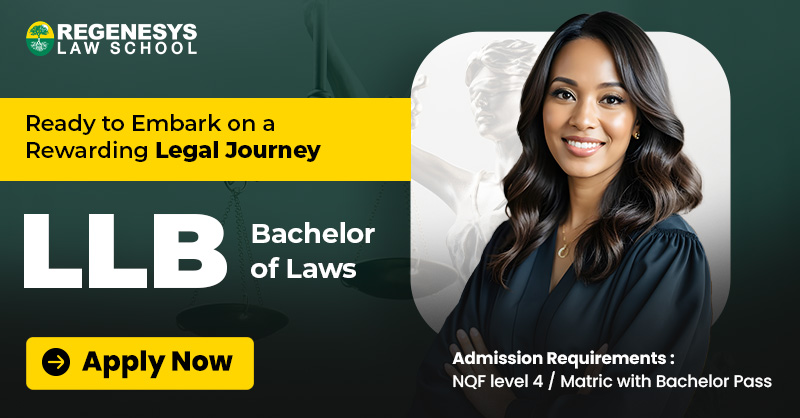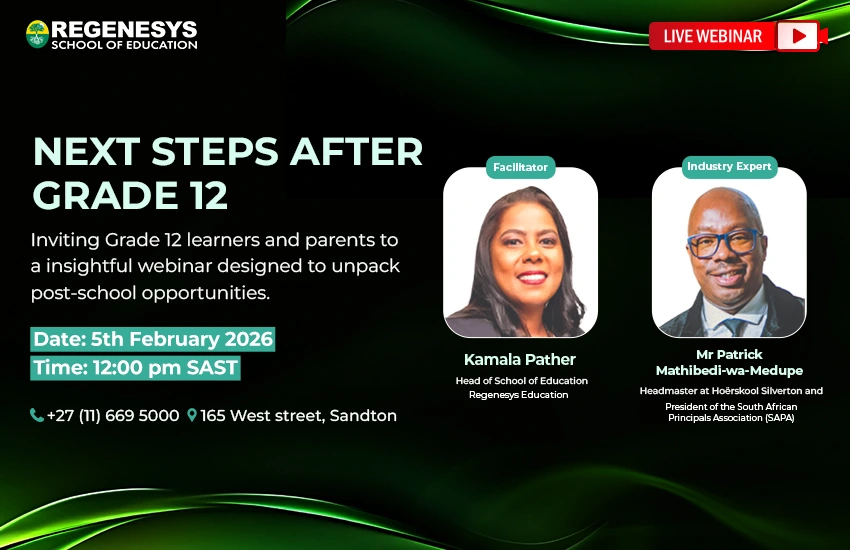The legal field remains one of the most respected and in-demand professions in South Africa. With social justice, corporate regulation, and human rights taking centre stage, many young professionals are now pursuing legal education to make a meaningful impact. The LLB programme in South Africa is a popular choice for those aiming to become qualified legal practitioners, offering both academic grounding and practical exposure.
Regenesys Law School’s Bachelor of Laws programme stands out for its industry relevance, experienced faculty, and a blend of theoretical and real-world learning. From legal ethics to intellectual property law, this comprehensive programme prepares students to take on a variety of legal careers. Whether you’re passionate about public law, corporate litigation, or academic research, a law degree in South Africa provides the ideal launchpad.
In this article, we will explore the LLB programme in South Africa in detail, covering curriculum, career opportunities, subject lists, fee structures, and more.
Table of Contents
- What is the LLB Programme?
- Why Study LLB in South Africa?
- Programme Curriculum & Duration
- Can You Do LLB in 3 Years?
- Eligibility Criteria
- Career Opportunities After LLB
- Top Employers Hiring LLB Graduates
- LLB vs Other Qualifications
- Study Mode Options
- Fees & Funding Options
- Conclusion
- LLB Programme in South Africa – FAQs

What is the LLB Programme?
The LLB, or Bachelor of Laws, is a four-year undergraduate qualification that provides in-depth legal education and training. It serves as the minimum academic qualification required to practise law in South Africa. Recognised at NQF Level 8 with 485 credits, the programme focuses on legal theory, principles of justice, and application of the law in both public and private sectors.
Graduates gain the knowledge and skills needed for admission into legal practice, including roles as attorneys or advocates. The curriculum includes areas such as family law, criminal law, constitutional law, and property law, ensuring a thorough grounding in the South African legal system.
Here’s what makes the Regenesys law degree in South Africa noteworthy:
- Qualification: Bachelor of Laws (LLB)
- Duration: 4 Years
- NQF Level: 8
- SAQA ID: 119076
- Mode: Online and Contact
Why Study LLB in South Africa?
South Africa presents a unique legal landscape shaped by its constitutional democracy, historical context, and ongoing reforms. An LLB qualification equips students with the ability to interpret, apply, and influence laws that affect real communities. With ongoing developments in governance, economic policy, and digital law, there is an increasing need for legal professionals in both traditional and emerging fields.
1. Industry Demand
South Africa’s legal sector continues to evolve in response to constitutional reforms, globalisation, and digital transformation. Legal experts are needed in diverse areas such as environmental law, labour relations, intellectual property, and corporate law. The LLB programme equips graduates to fill these vital roles, meeting the country’s legal and socio-economic needs.
- The demand for legal professionals in government, NGOs, and corporate sectors is growing steadily.
- Law professionals play a central role in policy, compliance, and dispute resolution.
- According to Job Outlook SA, legal jobs are among the top 20 most stable and sought-after professions.
2. Career Relevance
Studying LLB in South Africa positions you to work locally or internationally. It is particularly relevant to national priorities such as access to justice, socio-economic equity, and legal reform. Moreover, LLB jobs span across courts, private firms, media, academia, and public institutions.
Programme Curriculum & Duration
The LLB programme at Regenesys Law School provides a balanced combination of legal theory and practical application. The structure includes both compulsory and elective law subjects over a four-year period. The curriculum prepares students to interpret legislation, engage with legal systems, and participate in courtroom and advisory roles.
The table below provides an overview of the core law subjects covered in the programme:
|
Year |
Semester 1 |
Semester 2 |
Electives (Choose Any 2) |
|
Year 1 |
|
|
|
|
Year 2 |
|
|
– |
|
Year 3 |
|
|
– |
|
Year 4 |
|
|
|
Read on: What Subjects Are Needed to Become a Lawyer?

Can You Do LLB in 3 Years?
In South Africa, the LLB cannot be completed in three years. The programme is structured as a minimum four-year undergraduate degree. This is because of the comprehensive legal curriculum required by the Council on Higher Education (CHE) and the South African Qualifications Authority (SAQA), ensuring that graduates meet the academic requirements to enter the legal profession.
While some international universities (such as in the UK or Australia) offer a three-year LLB, the South African qualification framework mandates a longer period of study. The four-year duration allows students to cover both the foundational and advanced law subjects in sufficient depth, alongside critical skills such as legal research, ethics, and practical application.
Important to note:
- All accredited South African universities, including Regenesys, require four years of full-time study for an LLB.
- There is no three-year LLB pathway locally, even for students who already hold a prior degree.
- Postgraduate students who wish to enter the legal profession typically complete a two-year postgraduate diploma in law or related bridging programmes, but this is not an LLB.
Therefore, if you are planning to study law in South Africa, you should expect to dedicate at least four years to the LLB.
Eligibility Criteria
To enrol in the Bachelor of Laws at Regenesys, prospective students need to meet specific academic, language, and technical requirements. This ensures that learners are prepared for the intellectual and communication demands of the legal field.
The following criteria must be met:
- National Senior Certificate with a Bachelor’s pass or NQF level 4 equivalent
- English First Language: 50% | Second Language: 60%
- International students: A-levels with higher-level pass (26 APS)
- Competence in Mathematics and verbal reasoning
- Good written and oral communication skills
- Basic computer literacy and access to internet resources
Career Opportunities After LLB
An LLB qualification opens up diverse legal career paths across the public, private, and academic sectors. Graduates are equipped for traditional roles in the legal system, as well as emerging roles in compliance, journalism, and advisory services. Industries hiring include law firms, government, NGOs, academia, and media. The following are some of the common job roles one can explore after this qualification:
- Legal Adviser: Provide legal guidance to organisations on compliance, risk, and contracts.
- Public Prosecutor: Represents the state in criminal cases, ensuring justice is served.
- Legal Researcher: Conduct legal analysis to support legislation, policy, or litigation.
- Legal Journalist: Reports on legal issues and cases for newspapers, TV, or digital media.
- Assistant Prosecution Officer: Support prosecutors by preparing documents and reviewing evidence.
- Legal Assistant: Assist lawyers with client communication, file preparation, and case tracking.
- Law Professor: Teach law subjects at academic institutions and conduct scholarly research.
- Government Legal Services: Offers legal advice and support to various government departments.
Explore Career Opportunities for Bachelor of Law (LLB) Graduates
Top Employers Hiring LLB Graduates
Graduates of the LLB programme are in demand across multiple sectors in South Africa. Law firms, government departments, academic institutions, and private companies frequently recruit Bachelor of Laws graduates. These organisations value the analytical, ethical, and communication skills developed during this programme.
Here are some top employers hiring graduate LLB holders:
- Bowmans
- Webber Wentzel
- Legal Aid South Africa
- Norton Rose Fulbright
- ENSafrica
- Government Legal Services
- South African Human Rights Commission
- KPMG Legal
- Deloitte Legal
- University Law Clinics
LLB vs Other Qualifications
When considering a legal education, students often compare the LLB with other degrees such as the MBA or BCom Law. While all offer valuable career outcomes, they differ in focus, duration, and purpose. The LLB is best suited for those committed to legal practice, whereas alternatives may combine business or management elements.
|
Feature |
LLB |
BCom Law |
|
Duration |
4 Years |
3 Years |
|
Entry Criteria |
Matric + APS 26 |
Matric with APS 31, Mathematics 50%, English 60%, Additional Language 50% |
|
Career Outcome |
Legal Practice, Judiciary |
Legal Adviser, Career in Public Administration. |
|
Best for |
Aspiring Lawyers |
Students interested in law, business, corporate governance or compliance |
Read on Deciding Between BA Law vs LLB: What You Need to Know? here
Study Mode Options
Regenesys offers flexible study formats that accommodate students with different schedules and commitments. Whether you prefer face-to-face interaction or self-paced online learning, there is an option to suit your needs.
- Online: Study from anywhere with access to recorded lectures, discussion forums, and tutor support. Ideal for remote learners and full-time workers.
- Contact (In-Person): Attend regular on-campus classes with peer discussions and in-person assessments. Best for those who prefer structured learning.
Explore How to Choose the Right Law School for Your Bachelor of Laws?

Fees & Funding Options
Investing in an LLB law degree in South Africa is a strategic decision for long-term career growth. While tuition fees vary, Regenesys provides competitive pricing and multiple funding options that support students from all backgrounds. The institution offers several financial assistance options designed for aspiring legal professionals:
1. Financial Assistance for Aspiring Leaders
At Regenesys, every student deserves a chance to succeed, regardless of financial background. That’s why we have created accessible funding options, partnering with top institutions to make education affordable:
1. Student Hero
Access multiple student loan options from a single platform at no cost. Student Hero helps students apply, qualify, and compare educational funding solutions across major South African financial providers.
2. Fundi
Offers education finance for tuition, devices, accommodation, and more. Ideal for students looking for comprehensive academic support solutions.
3. Capitec Education Finance
Provides up to R500,000 in education loans with discounted interest rates and up to 84 months of repayment.
4. Nedbank Education Loan
Offers up to R400,000 in funding with flexible repayment structures to support long-term study plans.
5. FlexiPay
Regenesys’ in-house flexible payment system that allows students to manage their fees in smaller, more affordable instalments.
2. Key Benefits of Regenesys Funding Partners
- Flexible funding options tailored to your budget and needs.
- Fast, reliable application processes through trusted financial institutions.
- Convenience and transparency when navigating your payment plans.
Note: Financial assistance is subject to availability and eligibility. Students are encouraged to explore both internal and external funding options.
Conclusion
The LLB programme in South Africa provides a structured path into the legal profession, combining academic excellence with real-world application. Whether you’re aiming to practise law, join the public sector, or pursue research, an LLB degree delivers the knowledge and skills required to make a meaningful contribution to society. Regenesys Law School, with its comprehensive curriculum and flexible delivery modes, is an excellent starting point for your legal career.
Take the first step towards your future in the legal sector.
LLB Programme in South Africa – FAQs
Is an LLB programme in South Africa worth it?
Yes, it is a valuable qualification for those looking to enter legal, academic, or public policy fields. The law degree that South African employers seek is both versatile and respected.
How long does an LLB degree take?
The standard LLB duration is four years full-time.
Which subjects are required for law?
Law subjects include English, Mathematics, and sometimes History or Business Studies.
Can I study LLB part-time or online?
Yes, Regenesys offers blended learning options to suit various needs.
What are the LLB subject requirements?
Matric with Bachelor pass, APS 26, and strong English language skills.
What is the difference between LLB and BCom Law?
LLB focuses solely on legal education, while BCom Law combines business and law subjects.







